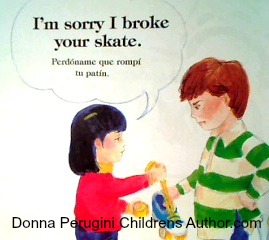Teaching Your Child to Apologize
The above page is taken from Don’t Hug a Grudge by Donna Perugini. Find the book here
Part One of Two …Teaching Your Child to Apologize and Why
from The 5 Languages of Apology by Drs. Gary Chapman and Jennifer Thomas.
Teach your child to accept responsibility for their actions
Let’s face it. Not all adults have been taught how to apologize. The information taken from The 5 Languages of Apology is meant to help not only you, but show you how to teach your child to
.
The first thing every child needs to know is accept responsibility for what you did. Start with your child (from age 2) through simple events. If your child let the dog in, teach them to say, “I let the dog in” instead of “The dog came in through the window”. Although it’s creative, it’s not teaching them to take responsibility for their actions. Do this by teaching them and having them rephrase their sentence with ‘I’ did it (whatever it was) and not just in negative situations. Watch them in positive situations also and have them rephrase with ‘I’ did it, to teach them ownership or being responsible for the action.
Your child needs to know their actions affect others
Teach them the Golden Rule…”Do to others as you would have them do to you.” When we do wrong, we are to say, “I’m sorry” to the person we wronged. Take your child through an apology with the other person and be sure to include, “I” am sorry and “I” did ___(pushed, broke your toy, messed up your room, called you names, etc.) to you which was wrong.
There are rules in life
A word about rules: Rules should help your child be safe, and grow up to be responsible. Not only do you have rules in your family, there are grandparent rules, school rules, God’s Words on rules, government rules, etc.
When you’re deciding on rules, try to have them include:
- Keeping your child from danger
- Building godly character…being kind, sharing, honesty, hard worker
- Rules to protect property
- Teaching good manners
- Being responsible to grow into a responsible adult
Rules not communicated in your family are unfair rules
Inform all members of your family what the rules are and as they grow older explain why you have those rules.
Rules can change
If you were raised a certain way and are now married with your own family, you can change the rules. As newly marrieds you may start out watching TV while eating dinner on the sofa. When you begin your family, you might just let that rule stand and your children will eat in front of the TV. When you see how unruly, non-participating as a family that is, you might change the rule to no TV on and everyone at the table while having dinner together. In our family, we value the time together and have a rule that the TV is off during dinner while we all sit at the table talking about the latest news in our family.
Next posting this subject is continued and finished
Yes, there is more on how to teach your child to apologize. Yes it should be simple, but what you understand you will retain and use. These two postings will help you understand, retain and use the information. You are well on your way to teaching your children to apologize! Interested in ordering a book? See the Amazon graphic below for deals.
Share this post with your friends…you might even want to Pin it!
Did your parents ever apologize to you as a child?








I love this. There’s a school of thinking these days that says you shouldn’t make your child apologize if they’ve hurt someone, but you should just model that behavior and hope they’ll pick up on it…I’m not really sure of the logic behind this, but I agree with you that children need to know that their actions affect others. I like the idea of telling your child to state what they did. It’s about being aware of that behavior and the affect it has on someone else.
Becky recently posted..Getting to Know You Better!
You’re kidding about that ‘school of thought’! If the whole idea of teaching your child is ‘just’ modeling, parents are missing boatloads of opportunity to teach their child in many ways. And that’s how children learn…many ways! Visual, verbal, tactile, audio, etc. I agree that our actions speak louder than our words, but words are definitlely important. Where do they come up with those ideas? Excuse my rant.
Your last sentence, “It’s about being aware of that behavior and the affect it has on someone else.” is right on the mark! Have you noticed there are adults who have no sense of ‘awareness’ and what their behavior does to others?